 The Reserve Bank of India (RBI) has notified the norms for banks with regards to two per cent interest subvention or subsidy for short-term crop loans during 2018-19 and 2019-20 under the interest subvention scheme approved by the central government. The Reserve Bank of India (RBI) has notified the norms for banks with regards to two per cent interest subvention or subsidy for short-term crop loans during 2018-19 and 2019-20 under the interest subvention scheme approved by the central government. |
| Interest subvention scheme Under the interest subvention scheme, the central government provides short term crop loan up to one year for a loan up to Rs. 3 lakhs. The Central government provides an interest subvention of 2 per cent for these short term crop loans. The RBI circular notes that interest subvention of 2 per cent will be calculated on the crop loan amount from the date of its disbursement/drawal up to the date of actual repayment of the crop loan by the farmer or up to the due date of the loan fixed by the banks whichever is earlier, subject to a maximum period of one year. For Farmers repaying the loan promptly an additional 2 per cent interest subvention is provided. This brings down the effective rate of short-term crop loans works out to be 4 per cent per annum. |
 The World Bank will provide a $250-million loan for the National Rural Economic Transformation Project (NRETP). National Rural Economic Transformation Project is a new sub-component under the Deendayal Antyodaya Yojana – National Rural Livelihoods Mission (DAY-NRLM) of the Ministry of Rural Development. The World Bank will provide a $250-million loan for the National Rural Economic Transformation Project (NRETP). National Rural Economic Transformation Project is a new sub-component under the Deendayal Antyodaya Yojana – National Rural Livelihoods Mission (DAY-NRLM) of the Ministry of Rural Development. |
National Rural Economic Transformation Project
|
 The National Annual Rural Sanitation Survey 2018-19 was conducted by an Independent Verification Agency under the World Bank support project to the Swachh Bharat Mission (Grameen). The National Annual Rural Sanitation Survey 2018-19 was conducted by an Independent Verification Agency under the World Bank support project to the Swachh Bharat Mission (Grameen). |
Findings of the Survey
|
| Swacch Bharat Mission Gramin As per the data from the Ministry of Drinking Water and Sanitation which is the implementing ministry of Swacch Bharat Mission Gramin, about 500 million people have stopped defecating in the open. As a result, the number of people defecating in open is down from 550 million at the beginning of the programme to less than 50 million today. Under the Swacch Bharat Mission Gramin, 9 crore toilets have been built across rural India under the Mission. Under the Mission over 5.5 lakh villages and 615 districts have been declared ODF, along with 30 ODF States and Union Territories. |
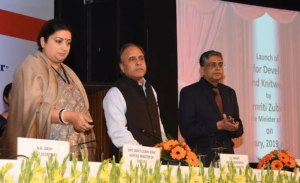 Union Minister of Textiles, Smriti Zubin Irani launched a comprehensive scheme for the development of knitting and knitwear sector under PowerTex India in New Delhi.Apart from financial incentives, the two key elements are Yarn Bank and financial assistance for the solar energy scheme. The yarn bank scheme for knitting and knitwear units will provide an interest-free corpus fund of a maximum of up to Rs 2 crore per yarn bank to a Special Purpose Vehicle(SPV). Under the Solar energy scheme, the government will provide financial assistance/capital subsidy to the extent of 50%, 75% and 90% of the basic cost of the solar plant to the applicants of General Category, SC, and ST respectively. Union Minister of Textiles, Smriti Zubin Irani launched a comprehensive scheme for the development of knitting and knitwear sector under PowerTex India in New Delhi.Apart from financial incentives, the two key elements are Yarn Bank and financial assistance for the solar energy scheme. The yarn bank scheme for knitting and knitwear units will provide an interest-free corpus fund of a maximum of up to Rs 2 crore per yarn bank to a Special Purpose Vehicle(SPV). Under the Solar energy scheme, the government will provide financial assistance/capital subsidy to the extent of 50%, 75% and 90% of the basic cost of the solar plant to the applicants of General Category, SC, and ST respectively. |
| Source: Business Standard |
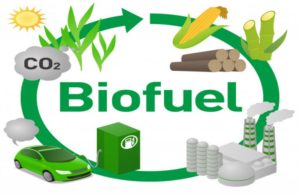 The Cabinet Committee on Economic Affairs, chaired by Prime Minister Narendra Modi approved the ‘Pradhan Mantri Jaiv Indhan- Vatavaran Anukool fasal awashesh Nivaran (JI-VAN) Yojana’ for providing financial support to the Integrated Bioethanol Projects. The scheme aims to incentivise the Second Generation (2G) Ethanol sector and support the industry by creating a suitable ecosystem for setting up commercial projects and increasing R&D in this area. The PM JI-VAN Yojana will be supported with the total financial outlay of Rs 1969.50 crore for the period 2018-19 to 2023-24. The Cabinet Committee on Economic Affairs, chaired by Prime Minister Narendra Modi approved the ‘Pradhan Mantri Jaiv Indhan- Vatavaran Anukool fasal awashesh Nivaran (JI-VAN) Yojana’ for providing financial support to the Integrated Bioethanol Projects. The scheme aims to incentivise the Second Generation (2G) Ethanol sector and support the industry by creating a suitable ecosystem for setting up commercial projects and increasing R&D in this area. The PM JI-VAN Yojana will be supported with the total financial outlay of Rs 1969.50 crore for the period 2018-19 to 2023-24. |
| Source: Business Standard |
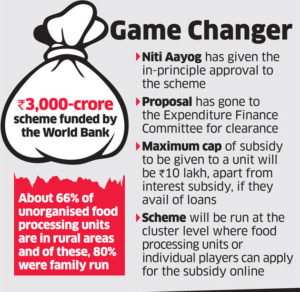 Gram Samridhi Yojana, a Rs 3,000 crore scheme funded by the World Bank and the Government of India, is being worked upon by the Ministry of Food Processing Industries in order to strengthen the unorganised food processing sectorconcentrated in rural areas. NITI Aayog has given its approval to the scheme. World Bank will be giving Rs 1,500 crore, Rs 1,000 crore will be borne by the Centre while state governments will put in Rs 500 crore. The scheme will be run in Uttar Pradesh, Andhra Pradesh, Maharashtraand Punjab for a 5-year period in the initial phase and thereafter in other states of the country. Gram Samridhi Yojana, a Rs 3,000 crore scheme funded by the World Bank and the Government of India, is being worked upon by the Ministry of Food Processing Industries in order to strengthen the unorganised food processing sectorconcentrated in rural areas. NITI Aayog has given its approval to the scheme. World Bank will be giving Rs 1,500 crore, Rs 1,000 crore will be borne by the Centre while state governments will put in Rs 500 crore. The scheme will be run in Uttar Pradesh, Andhra Pradesh, Maharashtraand Punjab for a 5-year period in the initial phase and thereafter in other states of the country. |
| Source: Economic Times |
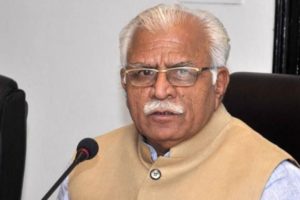 ‘Mukhyamantri Parivar Samman Nidhi’ scheme was launched by Haryana Chief Minister Manohar Lal Khattar in Chandigarh. It is primarily meant for farmers of the state who cultivate on land with areas up to 5 acres and the families with an income of less than Rs. 15,000 per month. The scheme would provide a sum of Rs. 6,000 yearly and each family has to nominate a member who will be provided with this amount. The scheme involves two categories of beneficiaries-in the age group of 18 to 40 years and the in the age group of 40 to 60 years. The scheme provides insurance facilities of- Rs. 2 lakh on natural death, Rs. 2 lakh for accidental death, Rs. 2 lakh for permanent disability and Rs. 1 lakh for partial disability. ‘Mukhyamantri Parivar Samman Nidhi’ scheme was launched by Haryana Chief Minister Manohar Lal Khattar in Chandigarh. It is primarily meant for farmers of the state who cultivate on land with areas up to 5 acres and the families with an income of less than Rs. 15,000 per month. The scheme would provide a sum of Rs. 6,000 yearly and each family has to nominate a member who will be provided with this amount. The scheme involves two categories of beneficiaries-in the age group of 18 to 40 years and the in the age group of 40 to 60 years. The scheme provides insurance facilities of- Rs. 2 lakh on natural death, Rs. 2 lakh for accidental death, Rs. 2 lakh for permanent disability and Rs. 1 lakh for partial disability. |
| Source: NDTV |
 A water conservation scheme ‘Jal Amrutha’ was launched by Karnataka chief minister H D Kumaraswamy, in Bengaluru. A function was organized by the Rural Development and Panchayat Raj department at Dr. B R Ambedkar Bhavan in Bengaluru. The scheme plans to make people aware of the importance of conserving water and to prompt them to come up with ways to avoid wastage of water. The state government has declared 2019 as the Year of Water. A water conservation scheme ‘Jal Amrutha’ was launched by Karnataka chief minister H D Kumaraswamy, in Bengaluru. A function was organized by the Rural Development and Panchayat Raj department at Dr. B R Ambedkar Bhavan in Bengaluru. The scheme plans to make people aware of the importance of conserving water and to prompt them to come up with ways to avoid wastage of water. The state government has declared 2019 as the Year of Water. |
| Source: The Hindu |
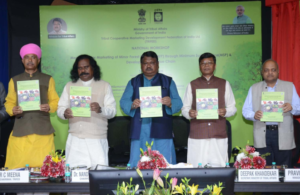 Union Minister of Tribal Affairs Jual Oram launched the ambitious scheme of the Ministry of Tribal Affairs named Van Dhan. The scheme is for Minimum Support Price (MSP) for Minor Forest Produce (MFP) and Development of Value Chain of MFPs at a National Workshop organized by TRIFED. The Scheme will offer remunerative Minimum Support Price for 50 commercially viable items to the Tribals. 6000 Van Dan Vikas Kendras comprising 300 tribal gatherers are to be set up to provide employment to almost 45 Lakh Tribal. He also launched the TRIFOOD Scheme, a joint initiative of Ministry of Food Processing Industry, Ministry of Tribal Affairs and TRIFED, and the “Friends of Tribes” initiative of the Ministry. Union Minister of Tribal Affairs Jual Oram launched the ambitious scheme of the Ministry of Tribal Affairs named Van Dhan. The scheme is for Minimum Support Price (MSP) for Minor Forest Produce (MFP) and Development of Value Chain of MFPs at a National Workshop organized by TRIFED. The Scheme will offer remunerative Minimum Support Price for 50 commercially viable items to the Tribals. 6000 Van Dan Vikas Kendras comprising 300 tribal gatherers are to be set up to provide employment to almost 45 Lakh Tribal. He also launched the TRIFOOD Scheme, a joint initiative of Ministry of Food Processing Industry, Ministry of Tribal Affairs and TRIFED, and the “Friends of Tribes” initiative of the Ministry. |
| Source: Press Information Bureau |
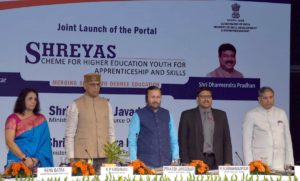 Union minister Prakash Javadekar launched ‘Scheme for Higher Education Youth in Apprenticeship and Skills’ (SHREYAS) for providing industry apprenticeship opportunities to fresh graduates. This scheme is a programme basket comprising the initiatives of three central ministries, including the HRD, Ministry of Skill Development and Entrepreneurship, and the Ministry of Labour and Employment. Union minister Prakash Javadekar launched ‘Scheme for Higher Education Youth in Apprenticeship and Skills’ (SHREYAS) for providing industry apprenticeship opportunities to fresh graduates. This scheme is a programme basket comprising the initiatives of three central ministries, including the HRD, Ministry of Skill Development and Entrepreneurship, and the Ministry of Labour and Employment. |
| Source: Business Standard |
You need to login to perform this action.
You will be redirected in
3 sec
